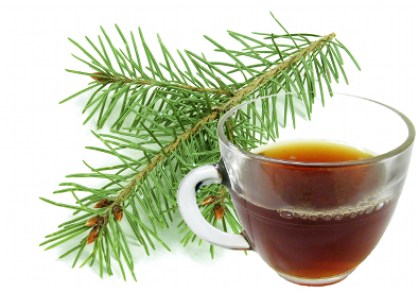Pine needle tea is made from pine trees and has been around for ages.
Pine needles are rich in vitamin C, vitamin K, vitamin A, an antioxidant beta-carotene, thiamin, riboflavin, niacin, pantothenic acid, vitamin B-6 (pyridoxine) and folates, a tea known for its pleasant aroma and delicious taste.
Pine needles have a long history of use as a pain reliever for arthritis, aches, pains, and sore muscles.
Centuries ago, mattresses filled with pine needles were used for treating rheumatic ailments, in Switzerland.
For coughs and bronchitis pine needle tea is an excellent remedy for acute bronchitis, especially when it is accompanied by stubborn and thick mucus production and expectoration.

The components in pine have wound-healing, decongestive, and disinfectant effects on the respiratory passages. Painful throat irritation is reduced and inflamed bronchi are soothed.
Preparing this tea is simple; to make pine needle tea, gather a small handful of pine needles from a tree, which grows away from pollution.
Cut the needles into 3/4″ lengths. You will need 1 teaspoon of needles for each 1-cup of hot water.
Pour boiling water over pine needles, cover, and steep for 15-20 minutes then sweeten to taste with honey or sugar or peppermint can also be added, even though pine needles are naturally sweet. However, for persons who are not accustomed to its taste, they normally add a sweetener.
Pine needle tea has many health benefits; it increases your strength and vitality and helps in reversing or slowing the aging process.
Packed with essential vitamins, it help to aid in the body’s ability to get over a cold faster and as such a good tea for the winter season.
Pregnant women must avoid this as pine needles is known to cause “abortion” this also happens in animals like cows, when they eat the pine needles they will drop their calf’s (dead) within a couple of days, so caution must be taken before consumption.



